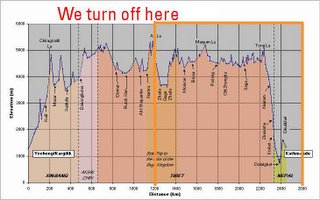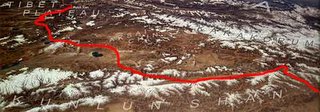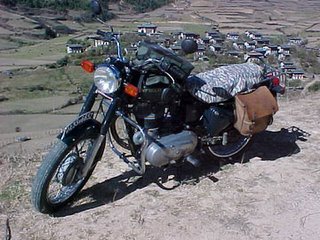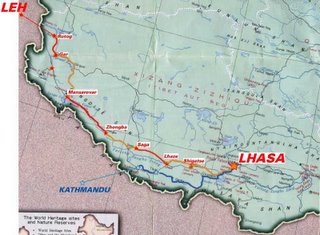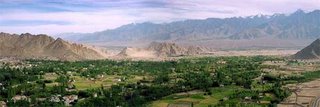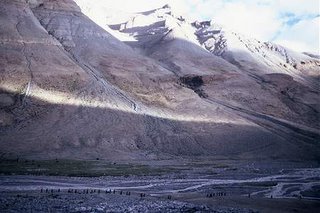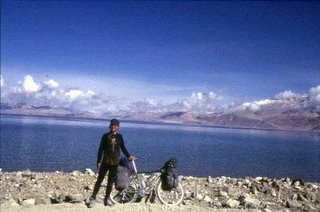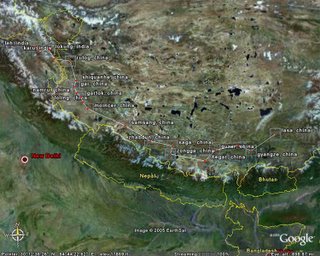- 3000 kms
- 20 passes (all above 4000 mts)
- Accross world's top 5 highest motorable passes!
- 1 month
- Past Kailash Mansarovar
- Will view - Mt Everest along the way
- Longest Himalayan Motorbike journey (so far)
Tuesday, November 29, 2005
the route in detail.
Rutok xian 4160 ASL occasional checkpoint. PSB!, international calls, bank of china, market, shops, turn left after the city for Ali
pass 4800 flat uphill until 1 km before top.
ALI 4370 MTS capital of ali prefecture, everything, hot shower, backpacker girls.$US cash to yuan - not travellers checks or VISA
pass 4735 by GPS. Turn left after Ali for shortcut. Don't follow telephone poles for 41 km longer nightmare road!
namru - old village, turn off to thölling
namru - new village, noodles, drinks, dormitory
4632 ASL by GPS. More like 7 km to pass.
basic food and beverage - -army base - basic food and beverage, shop, dormitory
basic food and beverage - -1
pass 4720 -
pass 4820 -
misar - important town. restaurants and shops. turn off to tirthapuri hot springs. Checkpoint at beginning of town.
river - difficult to cross,basic food and beverage - -
pass 4900
turn off darchen - after rivercrossing. Very bad road on downhill section. restaurants, shops, clothes, big rivercrossing just before town, small ones after town
turn off to purang -- shops, restaurant, gazoline station.
horqu - shops, restaurant, stuck up with supplies here. Turn left into the vally after town, not around the lake.
lake - Catch fish by hand. Very sandy road
mayun pass 5250 MTS ASL
tents and house - basic food and beverage
pass 4800
turn off to new zhongba - Big shops, restaurants, road-repair-station, internat. calls. 7 km.
1967 1703 22 first marker after misar - l----> N. Z. Turn left for town just after entering the big
old zhongba - basic food and beverage, shop, road-repair-station-road-repair-station - -
pass 5000
road-repair-station - -
road-repair-station - -
pass 4930 MST ASL
saga 4510 important town. restaurants and shops, etc. turn off to zhangmu. end of highway 219
ferry crossing - 2,5 Y per vehicle or free
pass 4830
pass 4860 Very bad road!
pass 4946
nature preserve center - basic food and beverage, sleep when open, checkpoint?
roadsplit - Turn left up into the pass just after the bridge
pass 5011
4 reaching highway 318 4600 Entering between a dobbelt pass
pass 5150
5 road-repair-station 4900 end of descending, begin of ascending. basic food and beverage. sleep. 4882 by GPS
pass 5120
village 4580 road-repair-station road-repair-station - -
2339 5326 8 road-repair-station - army base
nyalam 3810 important town, checkpoint before entering town
2389 5375 31 checkpoint - -
zhangmu 2800 important town, chinese border.
We Join here from the road from Lhasa...
kodari - nepalese border town
NEED PULL!!
Monday, November 28, 2005
Friendship Highway

The Friend Ship highway lies between kathmandu(Nepal) and lhasa(Tibet,China). Though it is termed as a "highway", its more of a bit of ruble layed out and covered by snow! It crosses upto 4-5 passes above 5000 mts and has snow on it for 365 days a year. in summer the streams cut away part of the highway, making it treachorously dangerous. Nevertheless it cant be more challenging and exciting...



maps!
the reason i am posting so many photos(sattelite) and maps, is to overcome this belief that we are "creating" a road. I insist,we are not, but are simply creating A journey from existing roads!

Sunday, November 27, 2005
Delhi to Beijing Solo!
With the closure of traditional trade routes between India and China like the Old Hindustan Tibet road in Himachal Pradesh and the Kalingpong to Lhasa route, the capitals of the two country's are now connected only with one all weather metalled roadway, via Nepal. Starting from Delhi, one has to first ride through the State of Uttar Pradesh and then cross over into Nepal and proceed towards Kathmandu, either directly or by slightly longer route, through Nepalganj and Pokhra.
The Sino-Nepal Highway starts from here, reaching up to Lhasa covering a distance of over 2500 km across the Himalayas and the Friendship Bridge into the Tibetan Plateau. Beyond Lhasa there are two alternative ways for proceeding towards Beijing. One is through Naqu and Golmund via the Quinghai-Tibet Highway in the north before turning north-east (the route of the 1997 Peking to Paris Rally), the other is via the Sichuan-Tibet Highway (No. 318 National Trunk Highway) to Chengdu in the east and then turn northwards towards Xian and to Beijing.
The preferred route would of course be the eastern one, i.e., via Chengdu, with a detour to Dali and Kunming via the Yunnan-Tibet Highway (a section of No.214 National Trunk Highway) and then onwards to China's ancient capital Xian, the nearby sacred Huashan mountains and culminating in historic Beijing. All places of historical and cultural importance, each playing a significant role in shaping the destiny and traditions of their country.
Who is he? here goes...
Why no pictures? - thats what even I asked. Please sir may we see some?Never having formally studied literature or journalism, twenty-nine year old Ravi J.Deka has nonetheless spent the last four years in the world of freelance writing, penning a contrasting array of stories stretching from travelogs and heritage studies to auto journalism. Till date his articles have featured in national newspapers like Business Standard and Sunday Observer and regional ones like The Assam Tribune and The Northeast Times. Overseas his renderings have appeared in prominent publications like Whole Life Times and Travelocity. Formerly a monthly columnist of the widely read "Indian Auto" magazine, he has also written on motorcycling related topics for widely popular Internet portals like www.streetbike.com and www.gonomad.com.


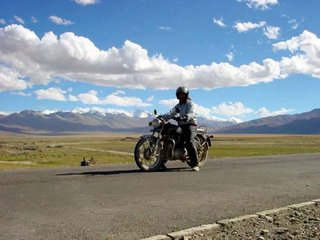
The "Indian sheperds"conduct bike tours tot he everest base camp, and around nepal - but no one has ever ventured on such a long, and sceneic journey - so we have a chance topull something out of the bag here.(http://www.asiasafari.com)
"The ride is a Barometer understanding challenge of high altitudes. Here oxygen is as sparse as population due to lack of tree line. It is an out of the World experience of riding classic technology Royal Enfield – 500 CC, surely an acid test of the technology & respect for Human endurance. This motorcycle safari shall surely leave us a changed biker - to have more confidence, compassion, love & respect for each other and mankind."(http://www.asiasafari.com)
Route 1: Kathmandu - Lhasa - Khamba la Base Camp - Khamba La (4970 M) - Nakartse - Yumdrok - Karo La (5045 M) - Gobsi - Simi La - Gyantse - Panam Dzong - Shigatse - Lhatze - Tingri - Everest Base Camp - Tingri – Nyalam - Zanghmu - Kodari - Nagarkotte - Bhaktapur - Chitwan - Kathmandu
Day 1 Flight to Nepal.
Day 2 Arrival in Nepal in the morning. Transfer to Dulikhel. We get to know each other and the motorcycles and enjoy the first sights of the Himalayan range.
Day 3 From Dulikhel along green Hills and terraces towards Tibet. From 400 m up to 3200 m at Nyalam.
Day 4 A first glimpse of the Himalayan panorama in Tibet. Xsisangpangma and Cho Oyo are (hopefully) visible on our way to Shegar.
Day 5 Further on to Shigatse, Tibets second largest city.
Day 6 A long trip to Lhasa.
Thursday, November 24, 2005

The highest road ever built! Just next o Pangong and China, we should be crossing this at some time. Its called Marsimik La (La meaning pass) and is about 500 ft higher then Khardungla (which is officially known as the highest motorable road in india! At khardungla there is always snow so i can only imagine what Masirmik would be like!
So the top 5 are all in ladakh
1 Masirmik la (we cover this) (some 6300 mts ASL)
2 Khardungla (some 600 mts ASL)
T3 anglang La (5800 mts ASL)
4 Chang La (We cover this) (5700 Mts ASL)
5 Lachung La (5500 mts ASL)
image courtesy 60kmph
So the top 5 are all in ladakh
1 Masirmik la (we cover this) (some 6300 mts ASL)
2 Khardungla (some 600 mts ASL)
T3 anglang La (5800 mts ASL)
4 Chang La (We cover this) (5700 Mts ASL)
5 Lachung La (5500 mts ASL)
image courtesy 60kmph
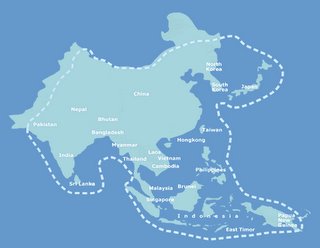
Well if we could splurge a bit, and if people felt home sick this is an option: ACeS - (Asian Cellular Satellite) Service Provider have coverage over the area we are going to, we can use the The
"Ericsson R190 pocket phone weighs just 210 grams, so for the first time this phone can be used for GSM and satellite calls without being too bulky. The R190 operates as a GSM or satellite phone or with GSM or satellite preferred; the phone will automatically switch to the
alternative network if the preferred mode is not found."

- Whopping 5 watts of transmit power (GMRS) means you can now call for help from 14 miles away (transmit power limited to 2 watts in Canada with a range up to 8 miles)
- Automatic route generation, off-route recalculation, turn-by-turn directions with alert tones, and icon-driven menus for finding points of interest.
- Mini USB and 56 megabytes of internal memory for rapid download and lots of map storage of Garmin’s entire line of outdoor cartography
- Rechargeable lithium-ion battery for up to 16 hours of outdoor use
- Barometric altimeter provides extremely accurate elevation for hikers and climbers
- Electronic compass so you can get a heading when standing still
- NOAA weather capability to keep you informed of changes in weather

Now thats a good place to be photographed! The bikes - thats the key. Will we get a bike that makes it through? I say a souped up Royal Enfield maybe the thunderbird for single riders and 500cc for riders with pillion. By souped up i mean -
upgraded (gas) suspension, disc brakes (front), heated hand grips (?), shock proof boxes and carrier for backpacks, provision to add a GPS on the dash board (next to the speedometers), Fog lights, upgrade 12V DC battery, Warmers (to keep the engines from getting cold at night), Tubeless tyres (boy what a difference this could make), strong clutch and brake cables, 45 litre fuel tank (or 22 liter but 45 is better).......
thats the bike part (with more to come) what else will we need? here goes..
GIS maps with elevation, route and climate details (?)
Solid gloves (to keep ur fringers from breaking off)
Digital Cameras with zoom
Laptop - to download the images
more as i figure them out.....
Wednesday, November 23, 2005
read the full story @ here
Lhasa literally meaning “Holy-Land”, is the heart and soul of Tibet, it has history of more than 1,300 years. Lhasa has remained Tibet's capital since 1642, and most of the city's historical sights date from the second stage of the city's development since the fifth Dalai Lama. Buddhism is a center form of Tibetan daily lifestyle. Monasteries and various temples are clustered in the city.
Lady's temple
Among those shrines, a ladies temple is quite unique and interesting. It is located within the Lhasa city in a residential area. Driving from downtown area will only take about 30 minutes. There are more than 150 lady monks living in the temple with a center garden and few souvenir shops. Residents in this temple will not participate in any activities outside the compound. They read Buddhist script, study Lamaism and helping each other with daily works. Tourists are allowed to enter, but limited to the worship area only.
Lhasa city has an elevation of 3,658 m, the city also known as Sunlight City, is the highest city in the world.
In Tibetan language, Lhasa means "The land of the Gods". Lhasa enjoys delightful weather, throughout all the seasons. The average temperature is 7.4 census. Most of the yearly rainfall hits in July, August and September.
From Lhasa to Samye Temple, one of the very significant Tibetan Buhdast monasteries takes about 4 hours by car. Then to shorten the distance, we got to the closest dock to cross the Yaluzampu river by boat. In a normal day, the boat operator will wait for a full load of passengers before departure. It only costs 15 RMB per person. However, if you are in a hurry, an option of paying 190RMB could satisfy the boat owner starts the engine immediately.
From the bank, the yaluzampu rive looks calm and narrow. I thought it would only take us 15 minutes to cross it. However, in a low water season, we had to take extra distance going up and down the river to avoid stock in the shallow riverbed. This way we spent more than an hour on the journey instead of 15 minutes. Everyone on the boat seemed to enjoy the trip and the stunning scenery, but the operator was so intense on his work. He had to fully concentrate on the invisible river route to make sure the boat will not get stocked. When we approached the parking dock, it was such a release showed on his face that everyone was happy of a safe landing. Nevertheless the way to reach Samye temple is not finish yet.
Samye was Tibet's very first monastery and has a history that spans over 1,200 years. It is designed to represent the Buddhist universe and many of the buildings in the courtyard are cosmological symbols. The central building of Samye, its foremost feature, comprises a mixture of architectural styles: the ground and first floors were originally Tibetan in style, the second floor was Chinese and the third floor was Indian.
With unique culture and religion, Tibetans have different ways of behavior in many aspects. There is an old Chinese saying: "Sing the local songs when you get to a local place." So please keep in mind the following tips:
1. Remember not to step on threshold when entering the tent or house.
2. Calling somebody in name please add "la" behind the name to express respects.
3. If you are asked to sit down, please cross your legs, do not stretch your legs forward and face your sole to others.
4. You should accept the gift with both hands. While presenting the gift you should bend your body forward and hold the gift higher than your head with both hands. While offering tea, wine or cigarette, you should offer them by both hands and any fingers do not tough inside of the bowl.
5. Do not touch, walk over or sit on any religious texts, objects or prayer flags in monasteries.
6. When the host presents you a cup of wine, you should dip your ring finger in the wine and flick the wine into the sky, in the air and to the ground respectively to express your respects to the heaven, the earth and the ancestors before sipping the wine. The host will fill the cup, and you take a sip of the wine again. After the host fills your cup again, you have to bottom it up.
7. Tibetan people do not eat horse, dog and donkey meat and also do not eat fish in some areas, so please respect their diet habits.
8. It is not polite to clap your palms and spit behind the Tibetan people.
9. Tibetan people stretch out their tongue to say hello to you. Also it is a courtesy to put their hands palm in front of breast.
10. Do not smoke in monasteries. Also it is banned to touch the statue of Buddha and religious articles and take pictures of them. In addition, all should walk clockwise (not in the Bon temples).
11. Seeing any dagobas, monasteries or Mani piles, please go around them clockwise (not of the Bon), do not cross them.
12. Eagles are the sacred birds in the eyes of the Tibetan people. You should not drive them away or injure them. On the outskirts, you could not drive or disturb the sheep or cows with red, green or yellow cloth strips on
Tuesday, November 22, 2005

Mt Kalish region as seen from Google earth, after a more detailed study i think we shall be missing Mt.Kalish by about 50 -60 kms (it being to our west) as it lies too close to the indian border. But we will still be able to see it (i really hope so), with no religious connections, I still want to see it! :)
Long 80 35N ,Lat 80 30N
Monday, November 21, 2005
Status
Tuesday, November 22, 2005
9:33:52 AM
Narayan
Friday, November 18, 2005
His Excellency,
The Ambassador of China
THE EMBASSY OF PEOPLE’S REPUBLIC OF CHINA IN INDIA
50-D, Shantipath, Chanakyapuri,
New Delhi-110021 India
Thursday, November 17, 2005
Sub: PERMISSION QUERY FOR ENTRY INTO CHINESE TIBET
Dear Sir,
We are a group of enthusiastic and experienced Bikers, who wish to conduct a motorcycle journey from the region of Tibet, originating at Lhasa, then riding through Tibet, and wish to enter India via Ladakh, and conclude at Leh, India. Please find in the sheets attached a Map we have traced using existing road maps available to plot a possible route.
We wish to do this for the following reasons
• Experience the extravagant and rare scenic beauty presented by the land
• Promote peace and well being between the two countries (India and China)
• Execute a never before motorcycle journey between two historic locations
• Raise money for charity to a notable and international aid agency.
I wish to enquire about the permission...........................................
Wednesday, November 16, 2005

The area with trouble! The part between Rutog and Lukung, where we have to pass throught about 100 kms of No Mans Land! Have to get permission from the chinese to exit the country, and permission from the Indians to enter!so this is the tricky part!
Am still wondering, how hard its going to be to persuade the chinese to allow me to bring in bikes from India and ride it around!Was thinking of trying to get a chinese manafacturer but then it woudl probably me a use and throw bike! which means we woudl need about 20 (for the 20 legs of the journey!!) :)
